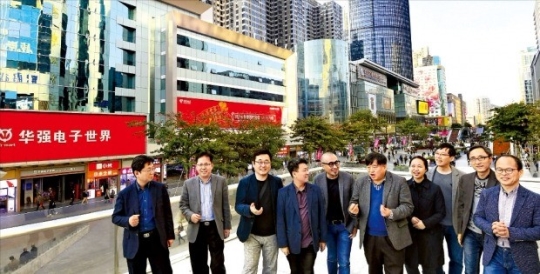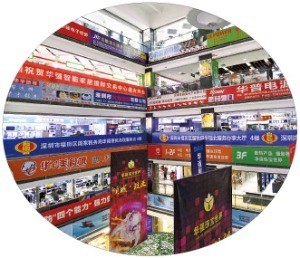Department News
[The Korea Economic Daily] 690 Startups Per Hour… “China’s Rapid Innovation is Scary”
Innovating China, Sprinting Shenzhen<?xml:namespace prefix = "o" ns = "urn:schemas-microsoft-com:office:office" />
Korea Economic Daily’s Special Press Team
Shenzhen aka ‘China’s Silicon Valley’: Global Leader of the Fourth Industrial Revolution
Chinese Government Encouraging Startups: “Ventures Shouldn’t Be Stopped by Old Regulations”
Forget ‘Chinese Fakes’… World #1 in Drones and Electric Cars
[ Article by Byeong-seok Cha ]
<?xml:namespace prefix = "v" ns = "urn:schemas-microsoft-com:vml" />

The special press team in Huaqiangbei, Shenzhen’s electronics marketplace. The team consists of Engineering professors from Seoul National University including Professor Heui Jae Pahk (fifth from the right) of Department of Mechanical and Aerospace Engineering, startup CEOs including Bongjin Kim (sixth) of Woowa Brothers, and Korea Economic Daily executives including Byeong-seok Cha, Deputy Managing Editor (second). Shenzhen=Beom-joon Kim bjk07@hankyung.com
A country where around 165,000 new companies are created per day, where young people are preoccupied by ventures than job searching, a country that counts for over one-third of participating companies (1551 out of around 4400) in world’s biggest technology exhibition, CES – it’s China.
China is rapidly rising as a world leader in innovation and growth. Venture companies are sprouting up everywhere. The number of startups have doubled in the last 3 years. Around 4,510,000 new companies were established in the 8-month period of January till September last year, which is 60 times of that of Korea (around 75,000). The startup boom has led to innovation, and innovation has elevated China to the leading spot of the Fourth Industrial Revolution.
Making ‘Chinese fakes,’ copying products of developed countries with cheap labor, is no longer the case here. Chinese companies are leading innovators in new industrial fields such as drones (automated planes), electric cars, big data, and fintech (financial technology). The big players are BAT (Baidu, Alibaba, Tencent), driving force of the IT industry; BYD, world’s number one electric car manufacturer, overtaking America’s Tesla; DJI, dominating 70% of the global drone market.
The Mecca of Chinese innovation is Shenzhen in Guangdong Province. It was designated as the first Special Economic Zone by Deng Xiaoping, following the commencement of the Chinese economic reform in December 1978. Shenzhen, a city that had once been the ‘birthplace of reform and opening-up,’ has now transformed into ‘China’s Silicon Valley.’ With a population of 12 million people, more than 15,040,000 companies (end of 2016) have been established in Shenzhen. That’s one company per every eight people. One-third of China’s venture capital is here, and there are more than 150 officially certified accelerators that support startups. It is not a coincidence that the headquarters of Huawei (telecommunications), Tencent, BYD, and DJI are all located in Shenzhen.

Huaqiangbei, a major electronics marketplace in Shenzhen
Shenzhen displays an ideal ecosystem of innovative startups, backed by a government very tolerant of new industries. Both central and city governments heavily encourage startup companies. “When new products and services like drones and fintech emerge, Chinese government doesn’t control them with existing regulations. They just let them be and watch them over. The government regulates them—but in a restrictive manner—only when they become a threat to the system or cause serious social disorder. New industries can’t not develop in this kind of environment.” (Taeeon Koo, Chief Attorney of Tek & Law)
In addition, Shenzhen has a solid system of industry-university-institute cooperation. Top Chinese universities such as Peking University, Tsinghua University, and Harbin Institute of Technology have campuses here, as well as local branches of institutes such as Chinese Academy of Sciences. These universities and institutes provide a constant supply of new technologies for venture founders, hence why the number of international patent applications from Shenzhen (19,647 in 2016) tower over those of Beijing (6651) and Shanghai (1560).
An extensive manufacturing network is a strong upholder of Shenzhen’s startup ecosystem as well. Shenzhen, where Foxconn’s factory manufactures 70% of mobile phones in the world, is undoubtedly a ‘paradise of electronics and machinery.’ With more than 10,000 parts factories located here, everything can be done from creating a small number of prototypes to manufacturing thousands of actual products.
Shenzhen, with such a vibrant startup ecosystem, is itself a giant venture incubator. Like a black hole, it attracts China’s human capital, technology, and money. Hence the percentage of foreigners in Shenzhen is over 90%. The average age of its population is young as well—32.5 years.
Shenzhen’s numerous startup companies are advancing China’s innovative technologies, challenging and competing against each other. China’s big data technology is already considered as world’s best; Goldman Sachs predicts that their artificial intelligence (AI) technology will soon catch up with America. “We still think China is tailing Korea, a leading country in IT. That’s a delusion. China is way ahead of Korea in the field of new technologies like AI, drones, self-driving cars, IoT, and fintech. Their rapid speed of innovation is almost scary. At this rate, Korea won’t be able to join the table—not even as China’s subcontractor—in the age of Fourth Industrial Revolution. We don’t have much time.” (Professor Heui Jae Pahk, Seoul National University’s Department of Mechanical and Aerospace Engineering)
With this desperation in mind, the Korea Economic Daily has arranged a special press team consisting of Engineering professors from Seoul National University and CEOs of startup companies, diving into the innovation hub of Shenzhen, China.
Shenzhen=Byeong-seok Cha, Deputy Managing Editor chabs@hankyung.com
Link to article: http://news.naver.com/main/read.nhn?mode=LSD&mid=sec&sid1=104&oid=015&aid=0003881989

